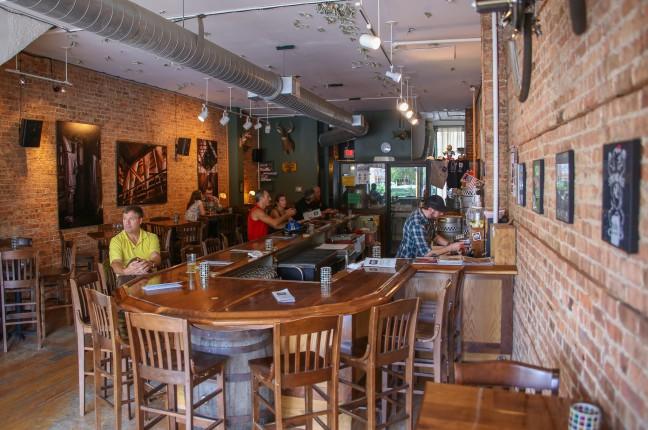Peter Gentry, owner of Madison’s One Barrel Brewing Company, lost 10 percent of average monthly revenue in the last two months. But, he has been consistently brewing and selling more beer.
Gentry’s conundrum is becoming exceedingly common in Wisconsin as a result of a 2011 law refusing “Class B” liquor licenses to many budding breweries.
The complicated legality threatens beer’s future in its arguably most popular state.
The three-tier system
Gentry’s dilemma dates back to a three-tier system implemented in Wisconsin after the Prohibition, said Mark Garthwaite, executive director of the Wisconsin Brewers Guild.
The first tier is producers and brewers, the second is wholesalers or distributors to different retailers and the third is the retailers who sell to consumers, he said.
The system sought to prevent large scale brewers from taking ownership of many different taverns and retail locations, selling only their products and thereby eliminating competition, he said.
It also permitted brewers to hold a Class “B” license for beer and another Class “B” for liquor. This allowed them to sell all types of alcohol within their own tap room while also preventing ownership of any taverns or retail stores of any kind.
But, in the early 2000s, members of the second and third tiers — wholesalers and tavern owners — disputed these licenses, believing it unfair that large, first tier breweries like Budweiser could hog profits if permitted to also sell liquor on their premises, Garthwaite said.
This led to a major law change in 2011 that had unforeseen consequences on small craft breweries in Wisconsin.
Budgetary bamboozlement
In the 2011 budget bill, statutes detailing liquor licenses were changed to supposedly accommodate the big-brewery issue.
The bill stated, “No person holding a Class “A” license, Class “B” license or wholesaler’s permit issued under this chapter may register as a brewer.”
As a result of this legislation, anyone hoping to obtain a brewing permit after June 2011 could not also sell liquor or wine of any sort in their tap room.
Realizing these restrictions could hurt smaller craft breweries that gain significant profit in their tap rooms and have lower distribution, lawmakers created the “brewpub.”
If a small brewery makes less than 10,000 barrels a year, they can receive a brewpub permit which also allows for a Class “B” liquor license, Garthwaite said.
But this adjustment has not always been successful.
To fight for the right to brew
One Barrel Brewing Company makes around 250 barrels of beer a year, well under the 10,000 limit, Gentry said. When he obtained a brewing permit in 2012, it was for a brewpub.
Gentry wanted to expand production, but the only way to seemingly do so under the current law was contract brew at another facility.
Gentry then moved two fermenters into House of Brews in Madison, but that’s when his legal troubles began.
There are “artificial barriers” in the current law regarding breweries, Garthwaite said, and one of these is what Gentry ran into: Brewers cannot maintain status as a brewpub and keep their Class “B” license if they contract brew at another facility.
Gentry tried to speak with politicians to change the law, fight it with his lawyers and even speak with the Department of Revenue, but still nothing has changed.
He finally switched over to a brewery permit two months ago. Since cocktails and liquor have left the tap room at One Barrel, Gentry has seen a 10 percent revenue shortfall.
To make matters more complicated, the 2011 law states that breweries in existence before said year are grandfathered into the right to sell liquor and wine. Thus breweries like Capital and Miller in Wisconsin still have this ability, while places like One Barrel do not.
“It’s been tough,” Gentry said. “I’ve had to make a decision whether or not to expand my production, or keep my liquor license. It’s hindered my business growth, and this law is doing the same for other small brewers around the state.”
Is the Golden Age of craft beer near its end in Wisconsin?
Garthwaite agrees with Gentry’s assessment, and has seen it throughout Wisconsin.
“We have 130 craft breweries in this state now,” Garthwaite said. “Small, local breweries have a $1 billion impact on this economy.”
This doesn’t just impact craft brewery owners either, but other small business owners, namely equipment manufacturers, packaging companies and those who build fermenters, Garthwaite said.
Garthwaite said Wisconsin has long been known as the beer state, but this law could allow other states with more favorable laws toward brewers to surpass it in production.
The simple fix is to create a small brewery permit that returns Class “B” privileges to these craft breweries, Garthwaite said. According to him, there’s also a fourth tier in this system that is affected: the consumers.
“If people love what they’re drinking, then they need to tell their lawmakers this needs to change,” Garthwaite said. “Otherwise, the Golden Age of craft brewing will be over, at least for the state of Wisconsin.”














